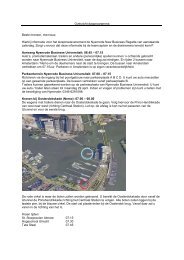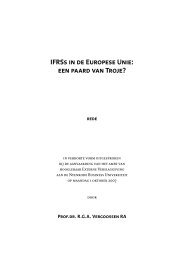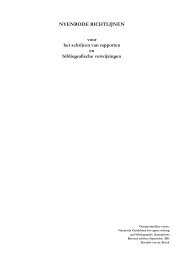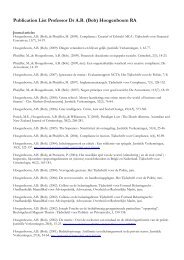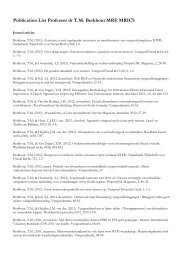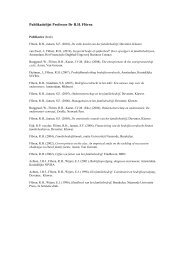pdf - Nyenrode Business Universiteit
pdf - Nyenrode Business Universiteit
pdf - Nyenrode Business Universiteit
Create successful ePaper yourself
Turn your PDF publications into a flip-book with our unique Google optimized e-Paper software.
5.2. IMPLICATIONS FOR PRACTICE 125<br />
and the compensation; and 3) the determination of the relevant difficulty of the performance<br />
target (i.e., what performance level qualifies as ‘good’ performance?). RPE helps<br />
to determine the difficulty of the performance targets and/or budgets to which managers<br />
are held accountable. By providing organizations with a means to set the performance<br />
standards, RPE plays an important role in the design of the Management Control System.<br />
This study shows that RPE is an effective and widely used praxis for evaluating business<br />
unit managers. RPE improves the quality of the performance evaluation if common external<br />
events affect the manager’s measured performance. Reducing noise improves the<br />
contractual efficiency between the business unit manager and his superior. This improvement<br />
has important consequences for the motivation of the business unit manager. In turn,<br />
increased motivation can help the organization realize its goals.<br />
If organizations wish to use relative performance targets, it is important to consider the<br />
composition of the peer group. Most organizations in my sample compare the performance<br />
of the evaluated manager to a group of internal peers. This has several benefits. Firstly,<br />
detailed performance data on internal peers is mostly available at low costs. Secondly,<br />
internal peers face, in general, highly similar external events. In this sense, the comparison<br />
to internal peers is highly efficient to reduce noise. However, using internal peers is<br />
probably not an effective option for another application of RPE use, namely the reduction<br />
of managerial opportunism.<br />
Organizations may wish to use RPE to mitigate managerial opportunism. However, as<br />
it is currently implemented throughout my sample, RPE does not seem to be a suitable<br />
means of reducing the room that business unit managers have to engage in opportunistic<br />
behaviour. This is probably because of the fact that organizations primarily rely on internal<br />
peer groups. If organizations aim to use RPE for opportunism-reduction, the use<br />
of internal peers does not seem to be an effective design choice. This finding does not<br />
mean that the RPE cannot help organizations reduce the opportunism of their employees.<br />
In fact, RPE may still be effective in opportunism-mitigation if designed differently. My<br />
suggestion is that organizations use a benchmark peer group that cannot be easily influenced<br />
by the evaluated manager, by, for example, comparing the manager’s performance<br />
to the performance of a group of competitors outside the organization. This use of RPE is<br />
similar to the application of RPE amongst top executives, where the effectiveness of RPE’s<br />
opportunism-reduction properties is supported by empirical literature.<br />
These considerations suggest that, when implementing RPE use in the Management Control<br />
System, organizations are well advised to make an a priori decision on wether they<br />
want to use RPE for the reduction of noise, or the mitigation of managerial opportunistic<br />
behaviour.





